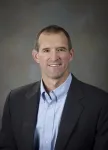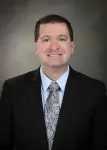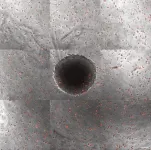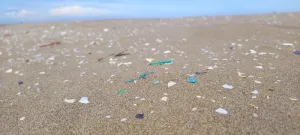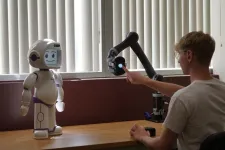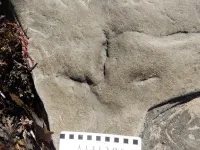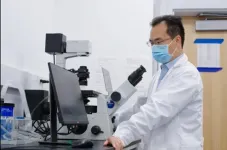(Press-News.org) ALBUQUERQUE, N.M. — Two Sandia National Laboratories employees will soon join the American Institute of Aeronautics and Astronautics class of 2024 as associate fellows.
“This distinguished group of professionals has made significant and lasting contributions to the aerospace profession,” said AIAA President and Sandia Deputy Laboratories Director Laura McGill. “They exemplify expertise and dedication to excellence in advancing their specific technical disciplines. They are truly shaping the future of aerospace, and we are proud of their achievements.”
Michael Ross
Michael Ross was recognized for his work in structural dynamics with an emphasis on fluid-structure interaction. During his 15 years at Sandia, he has worked on everything from satellites and rockets to airplanes and wind turbines.
“I conduct structural analysis,” Ross said. “I figure out what the loads are when we put these objects into space or the atmosphere. Is the structure sound? I figure out what it will take to ensure it remains structurally sound and doesn’t fall apart.”
The AIAA points out that his work has had a significant impact on systems and components at Sandia, with him contributing more than 100 design analyses in one system. His work has been instrumental in obtaining flight certifications and providing qualification evidence for numerous systems.
Ross said he is especially proud of his work on the B61-12 and on wind energy projects.
“There was this analysis we helped with where they had water turbines generating energy in currents, and we assisted with the structural aspects and redesigning them,” Ross said.
Ross began his work at Sandia in code development, where he was a key member in coupling the Navy’s Gemini code with in-house structural analysis codes. This code is now used by the Navy to predict underwater ship explosions.
When asked what this honor means to him, Ross said, “It’s really nice, but what’s even better are the congratulatory emails I’m receiving. These are coming from AIAA fellows at Lockheed Martin and Skunk Works. I have even heard from an astronaut and others at NASA. It’s more about the community I’m impacting. That means a lot.”
Ross said the rewards of his work also come from the outreach he does at local schools.
“I go and talk to students about what it means to be an aerospace engineer,” he said. “Those are the things that really touch me. Sometimes I appear with astronaut Stephanie Wilson, so the kids are all hyped up and want my autograph. I’m a space engineer, they think it’s so cool. It’s pretty touching.”
Brian Freno
Brian Freno has been working at Sandia for eight years. His childhood helped pave his career path.
“My father was an Army dentist, so growing up on military bases instilled a sense of patriotism in me,” Freno said. “I wanted to figure out how to serve our country. When I graduated from high school, I wasn’t sure whether I wanted to be a pilot or a mathematician. Some people mentioned engineering. So, when it was time to declare a major, I saw aerospace engineering alphabetically listed after accounting. I said, ‘let’s see how this goes,’ and I eventually earned three degrees in it.”
Freno is a principal member of the technical staff at Sandia, specializing in computational physics research.
“We strive to ensure that simulations are credible,” he said. “I devise approaches to verify that numerical methods are correctly implemented in physics codes; this is known as code verification. These codes are used to model a variety of physics phenomena and are used to simulate various weapons and other applications.”
The AIAA credits Freno with making contributions to the fields of fluid dynamics, ablation and heat transfer, structural dynamics, electromagnetics, reduced-order modeling, code verification, numerical integration and machine learning. Especially noteworthy are the code-verification techniques Freno recently developed for integral equations to isolate and measure the different sources of numerical error. This work filled a major credibility gap for integral equations and added to the credibility evidence in computational electromagnetics codes.
Freno said being named an associate fellow is humbling.
“I am grateful for it,” he said. “I am extremely honored because this is a very selective process. I am thankful for those who took the time to put together a nomination package that convinced an anonymous review committee that I was worthy of this honor.”
A new chapter
The pair will be inducted on Jan. 10 during the 2024 AIAA SciTech Forum in Orlando, Florida.
To be selected as an associate fellow, an individual must be an AIAA senior member in good standing with at least 12 years of professional experience and be recommended by three AIAA associate fellows.
This marks a new chapter in their careers.
“The AIAA associate fellows personify the innovation that drives our industry forward,” said Dan Dumbacher, AIAA executive director. They embody the ingenuity and commitment that are crucial for developing solutions to the complex questions raised across the aerospace community.”
Ross said he has some advice for those who are just starting out.
“One thing I would recommend to any young staffer is to get involved in a professional society,” he said. “It’s something to have that community and realize people have similar problems. We work with NASA and Lockheed Martin and other companies like it. Getting to know some of those professionals is wonderful. I’ve also had some wonderful interns through this partnership.”
For more information, visit: www.aiaa.org.
Sandia National Laboratories is a multimission laboratory operated by National Technology and Engineering Solutions of Sandia LLC, a wholly owned subsidiary of Honeywell International Inc., for the U.S. Department of Energy’s National Nuclear Security Administration. Sandia Labs has major research and development responsibilities in nuclear deterrence, global security, defense, energy technologies and economic competitiveness, with main facilities in Albuquerque, New Mexico, and Livermore, California.
Sandia news media contact: Kim Vallez Quintana, kdquint@sandia.gov, 505-537-3294
END
Two Sandia National Labs researchers elected associate fellows for aerospace contributions
2023-11-15
ELSE PRESS RELEASES FROM THIS DATE:
UTHealth Houston researcher receives NIH subcontract to study effects of integrated palliative care on Parkinson’s, related dementia
2023-11-15
A five-year, $3.9 million grant to study the effects of integrated palliative care on health service outcomes and disparities in Parkinson’s disease and Parkinson’s disease dementia has been awarded to UTHealth Houston and other institutions by the National Institute of Neurological Disorders and Stroke, part of the National Institutes of Health.
As part of the grant, Adriana Pérez, PhD, professor in the Department of Biostatistics and Data Science with UTHealth Houston School of Public Health ...
Shape-shifting immune cells offer new insights into cancer immunotherapy
2023-11-15
Macrophages, a type of white blood cell that can destroy invading pathogens, have an innate ability to infiltrate tumor cells, making them a potentially important tool in treatments that use transplanted cells to fight disease, known as cell therapy. In the lab, macrophages show a lot of promise in treating cancer but so far, clinical trials have been a disappointment and biologists are trying to figure out why.
But what if it’s not a biological problem?
In a recent paper, researchers from the Harvard John A. Paulson School of Engineering and Applied ...
All aquatic species in river mouths are contaminated by microplastics
2023-11-15
All aquatic species in the river mouths flowing into the Mediterranean Sea and Atlantic Ocean are contaminated with microplastics, with molluscs being the most affected due to their ability to filter water. Rivers are one of the main sources of pollution by microplastics (5 to 0.0001 mm in size) and nanoplastics (smaller than 0.0001mm) in the oceans. Estuaries, as transition zones between rivers and the sea, are major hotspots for the accumulation of these particles, which are retained in sediments. They pose a threat to aquatic ecosystems given their ability to capture harmful chemicals from the surrounding environment, ...
Smaller hippocampus linked to cognitive decline
2023-11-15
MINNEAPOLIS – With the rise of new drugs that can target the amyloid-beta plaques in the brain that are an early sign of Alzheimer’s disease, new ways are needed to determine whether memory loss and thinking problems are due to Alzheimer’s disease or another neurodegenerative disorder. A new study published in the November 15, 2023, online issue of Neurology®, the medical journal of the American Academy of Neurology, shows that shrinkage in the hippocampus area of the brain is associated with cognitive decline, even in people who don’t have amyloid plaques in the brain. The hippocampus plays a role in memory.
“These results suggest ...
ECOG-ACRIN and PrECOG announce multiple presentations at the American Society of Hematology (ASH) 2023 annual meeting
2023-11-15
Researchers with the ECOG-ACRIN Cancer Research Group (ECOG-ACRIN) and PrECOG, LLC, will present six oral and three poster presentations at the 65th American Society of Hematology (ASH) Meeting & Exposition, occurring in San Diego, California and virtually December 9-12, 2023. The presentations focus on treatments for acute leukemias and lymphomas.
Among the data are the promising results of the phase 2 PrE0405 trial, which evaluated bendamustine, rituximab, and venetoclax for the initial treatment of mantle cell lymphoma in older patients. Other ...
Use it or lose it: New robotic system assesses mobility after stroke
2023-11-15
Embargoed: Not for Release Until 2:00 pm U.S. Eastern Time Wednesday, 15 November 2023
Stroke is a leading cause of long-term disability worldwide. Each year more than 15 million people worldwide have strokes, and three-quarters of stroke survivors will experience impairment, weakness and paralysis in their arms and hands.
Many stroke survivors rely on their stronger arm to complete daily tasks, from carrying groceries to combing their hair, even when the weaker arm has the potential to improve. Breaking this habit, known as “arm nonuse” or “learned nonuse,” can improve strength and prevent injury.
But, determining how much ...
Birds set foot near South Pole in Early Cretaceous, Australian tracks show
2023-11-15
The discovery of 27 avian footprints on the southern Australia coast — dating back to the Early Cretaceous when Australia was still connected to Antarctica — opens another window onto early avian evolution and possible migratory behavior.
PLOS ONE published the discovery of some of the oldest, positively identified bird tracks in the Southern Hemisphere, dated to between 120 million and 128 million years ago.
“Most of the bird tracks and body fossils dating as far back as the Early Cretaceous are from the Northern Hemisphere, particularly from Asia,” says Anthony Martin, first ...
University of Kentucky bioengineer designs tools to improve treatment for head and neck cancer
2023-11-15
LEXINGTON, Ky. (Nov. 15, 2023) — One University of Kentucky researcher is working to develop new techniques for radiation treatment to improve survival rates of patients with a specific type of cancer.
Caigang Zhu, Ph.D., is an assistant professor in the Department of Biomedical Engineering in the UK Stanley and Karen Pigman College of Engineering. He is also a member of the Molecular and Cellular Oncology Research Program at the UK Markey Cancer Center.
The National Institute of Dental and Craniofacial Research of ...
New plant hardiness map, used by gardeners nationwide and based on OSU climate data, unveiled
2023-11-15
CORVALLIS, Ore. – The U.S. Department of Agriculture today released its new Plant Hardiness Zone Map, the national standard by which gardeners can determine which plants are most likely to survive the coldest winter temperatures at a certain location.
The USDA describes the latest map, jointly developed by Oregon State University’s PRISM Climate Group and the USDA’s Agricultural Research Service, as the most accurate and detailed it has ever released.
PRISM, part of the OSU College of Engineering, stands for Parameter-elevation Regressions on Independent Slopes Model. The previous version of the plant hardiness map, also based ...
An engineered protein enhances memory
2023-11-15
Neuroscientists at the Faculty of Medicine and Surgery of the Catholic University, Rome, and the Fondazione Policlinico Universitario Agostino Gemelli IRCCS have genetically modified a molecule, the protein LIMK1, which is normally active in the brain, with a key role in memory. They added a "molecular switch" that is activated by administering a drug, rapamycin, known for its several anti-aging effects on the brain.
This is the result of a study published in the journal Science Advances, which involves the Catholic ...
